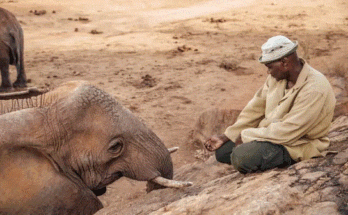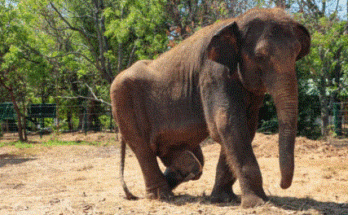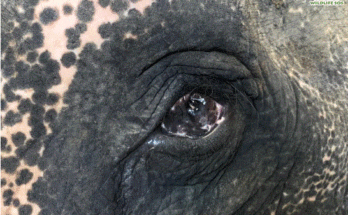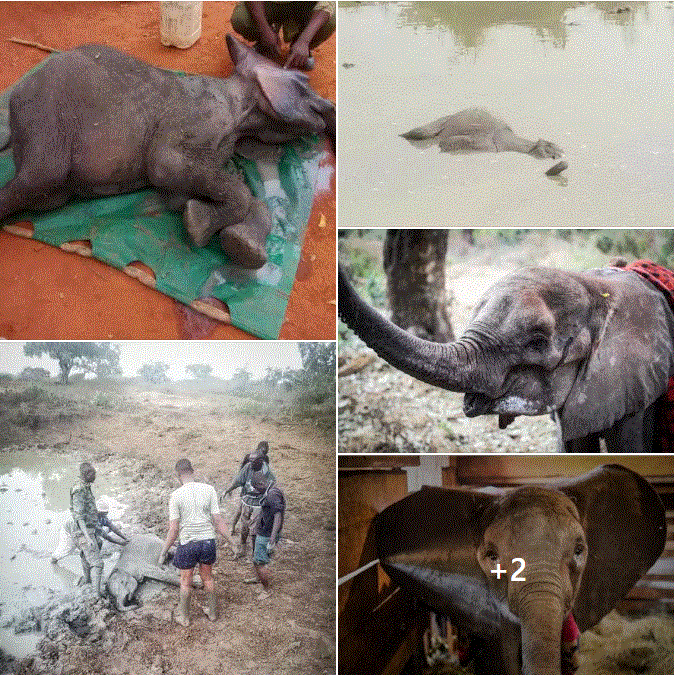
The sun rose quietly over the forest, painting the sky with soft streaks of gold and pink. Birds chirped from high in the canopy, and the leaves rustled under a gentle breeze. But deep within the forest’s heart, in a forgotten patch of marshland where time seemed to move slower, something was terribly wrong.
There, stuck in the thick, suffocating embrace of a muddy lake, was a young female elephant. She was half-submerged, her massive body sunken into the swamp like a ship going down. Only her trunk remained visible above the surface, trembling with each desperate breath, flicking weakly as she struggled to keep it above water. Her eyes were barely open, her energy almost gone. She had been fighting for hours, maybe longer. Now, she was fading—slowly slipping away in silence.
No one knew how she had gotten there. Perhaps she wandered too far from her herd. Perhaps she was chased, or simply lured by the smell of water during a brutally dry season. But once she stepped into the bog, the earth betrayed her. What had looked like a shallow pool turned out to be a death trap.
Her legs thrashed at first, but the more she struggled, the deeper she sank. She cried out, trumpeted for help—but no one came. She was alone, vulnerable, and stuck. The mud had formed a vice around her body, pinning her under the surface, and all she could do was keep that trunk lifted—just enough to breathe, just enough to hope.
Until fate intervened.
Several kilometers away, a ranger team from a local wildlife rescue center had begun their morning patrol. They were used to responding to poaching alerts, bushfires, and habitat concerns, but on this day, a faint sound on the wind caught their attention. A low, gurgling trumpet—barely audible, as if calling from underwater. Curious and concerned, they followed the sound.
What they found shook them.
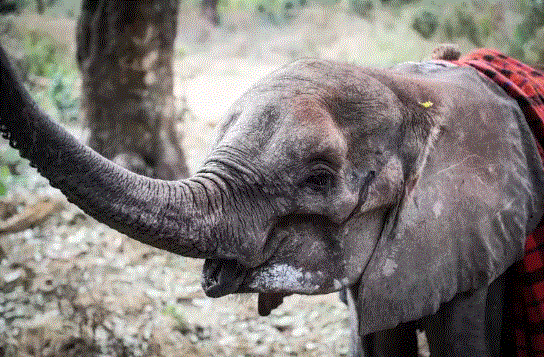
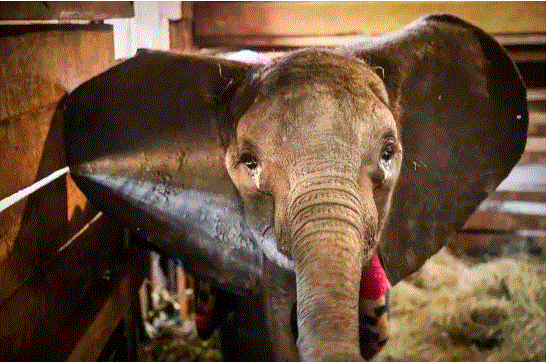
As they emerged from the trees, they saw her. Half-hidden by reeds and mud, the elephant’s massive body looked almost lifeless. But then her trunk twitched, curling weakly toward them. One of the rangers gasped. “She’s still alive.”
They sprang into action.
The team, led by a seasoned ranger named Arun and a young volunteer named Lila, immediately understood the urgency. Time was not on their side. Elephants are intelligent and strong, but they are not built to survive in deep mud. Panic and exhaustion were already setting in—and if she sank any deeper, her story would end in that swamp.
Lila, despite her small frame, was the first to move. Without hesitation, she stepped into the sticky water, wading slowly until she reached the elephant’s trunk. It was cold, shaking, slick with mud. She reached out gently, wrapped her hands around it, and whispered, “You’re not alone anymore.”
In that moment, something shifted.
The elephant stilled. Her eyes opened just slightly. For the first time in hours—maybe longer—she felt something: not fear, not pain, but presence. A warm, human touch in a world that had forgotten her. That one moment—Lila’s touch—was the beginning of a miracle.
Arun coordinated the rest of the team. They brought ropes, branches, tarps, and shovels. A call was sent to the rescue center for reinforcements, including a vet and a team with a winch truck. It would take hours for help to arrive, so until then, the team had to keep her calm, safe, and breathing.
Lila never left her side.
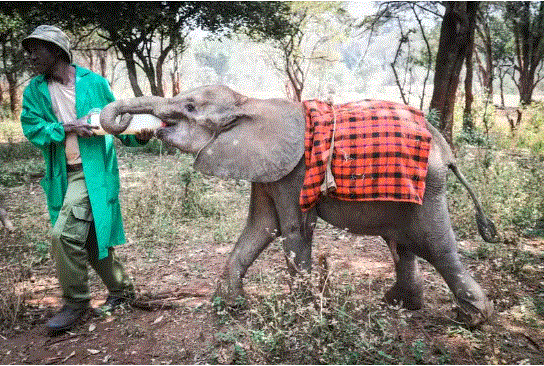
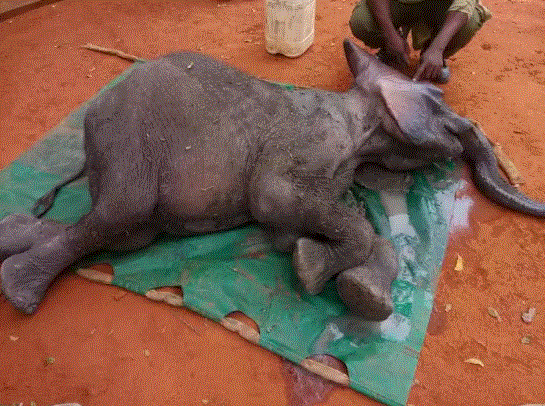
For hours, she knelt in the mud, speaking softly to the elephant, stroking her trunk, keeping her connected. Whenever the elephant tried to move or cried in fear, Lila held on and reassured her. “We’ve got you,” she whispered again and again. “You’re not going to die here.”
Eventually, the rescue equipment arrived. The plan was risky—elephants are incredibly heavy, and the wrong move could injure her further. But there was no choice. The team worked in perfect coordination, wrapping ropes under her body, placing logs to act as a support, and gently easing the winch into position.
The mud didn’t let go easily. It held fast, trying to claim her. But the team refused to surrender. Inch by inch, pull by pull, they lifted her from the lake’s death grip. She cried out once—loud, raw, a trumpet of pain and fear and hope all at once. But the moment her shoulder broke the surface, a cheer erupted from the team.
They had done it.
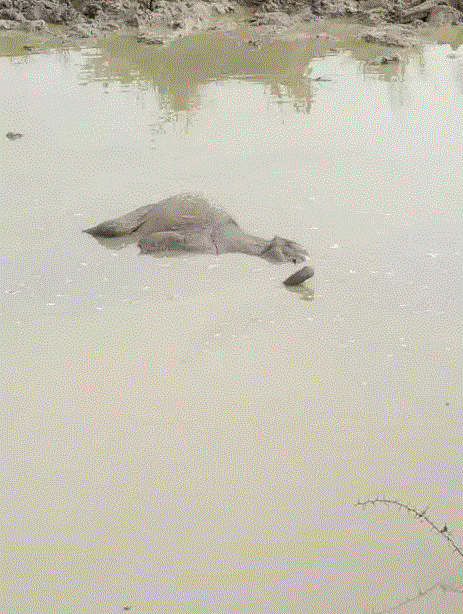
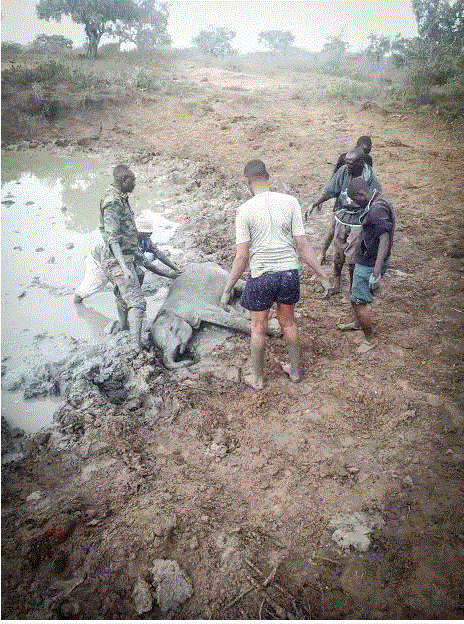
When her full body was finally freed, she lay on the ground, heaving for breath. The mud clung to her skin like armor, but her eyes—oh, her eyes—were alive. She wasn’t broken. She had survived.
The vet checked her immediately. Dehydrated, bruised, stressed—but no broken bones. No internal injuries. She would live.
Over the next few hours, the team stayed with her, feeding her water and fruit, letting her rest. When she finally stood—shaky, but strong—the team stood back, giving her space. She looked at them one last time. Her gaze settled on Lila. Their eyes met. And in that quiet exchange, something was said without words: Thank you.
Then she turned and walked away—slow, deliberate steps back toward the forest. Back to freedom. Back to life.
Her story quickly spread across the globe. The footage of her rescue went viral—an image of her trembling trunk reaching for help, of Lila holding on, of the moment she stood again. It moved millions. It reminded people of something we often forget in the noise of daily life: that even the smallest act of compassion can save a life.
She became a symbol—not just of survival, but of the deep, unspoken bond between humans and animals. A reminder that every creature, no matter how big or wild, deserves mercy.
And Lila? She never stopped visiting that lake. Every now and then, she returns—hoping to glimpse the elephant again, listening for the soft whisper of a trumpet in the distance.
Because some miracles deserve to be remembered forever. 🐘💔🙏
